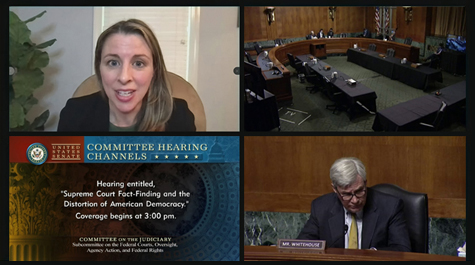Professor Allison Orr Larsen Offers Senate Testimony on Supreme Court Fact-Finding
Allison Orr Larsen, Professor of Law and Director of the Institute of the Bill of Rights Law at William & Mary Law School, testified before the Senate Judiciary Committee (subcommittee on Federal Courts) on Tuesday, April 27, 2021.
The hearing involved “Supreme Court Fact-Finding and the Distortion of American Democracy.”
Chairing the hearing, Sheldon Whitehouse (D-RI) maintained that certain cases in the Roberts Court, in particular Citizens United v. Federal Elections Commission and Shelby County v. Holder, derived outcomes from what he said were false facts introduced from outside the record.
Professor Larsen was first to offer testimony via Internet link. Building on years of research, Larsen described how the internet age has given rise to Supreme Court decision making based on generalized factual claims and a turn toward empirical factual support for legal arguments that can be marshaled quickly by any interested party that can call itself an expert.
Larsen said that by turning to motivated interest groups to fill the need—and relying on the amicus briefs themselves as evidence on factual claims—the Court risks tainting its decisions with unreliable evidence.
When asked how the problem could be solved, Larsen said amicus briefs need more rigorous “adversarial testing” and disclosure of funding sources.
Also offering testimony and taking questions were Theodore M. Shaw of UNC School of Law; Paul M. Smith of the Campaign Legal Center in Washington, D.C.; Thomas M. Fisher of the Office of Attorney General Todd Rokita, State of Indiana; and Ilya Shapiro of the Robert A. Levy Center for Constitutional Studies, Cato Institute.
“I am honored that the Senators wanted to talk about my research, and I hope I was helpful to them,” Larsen said. “For years I have been arguing that the rules governing appellate fact-finding need to be updated to accommodate technological advances, and I am really delighted that the issue has received attention from the Senate.”
Larsen said that she was glad to discover several people at the hearing using the word “facty” to describe Supreme Court decisions.
“This is a word I have been stubbornly using for years, and maybe this is my chance to get it accepted into the legal lexicon,” Larsen said.
To view the hearing, please visit the Committee on the Judiciary web page.
About William & Mary Law School
Legal education in a university setting began at William & Mary in 1779. Now in its third century, America's first law school continues its historic mission of educating citizen lawyers who are prepared both to lead and to serve.